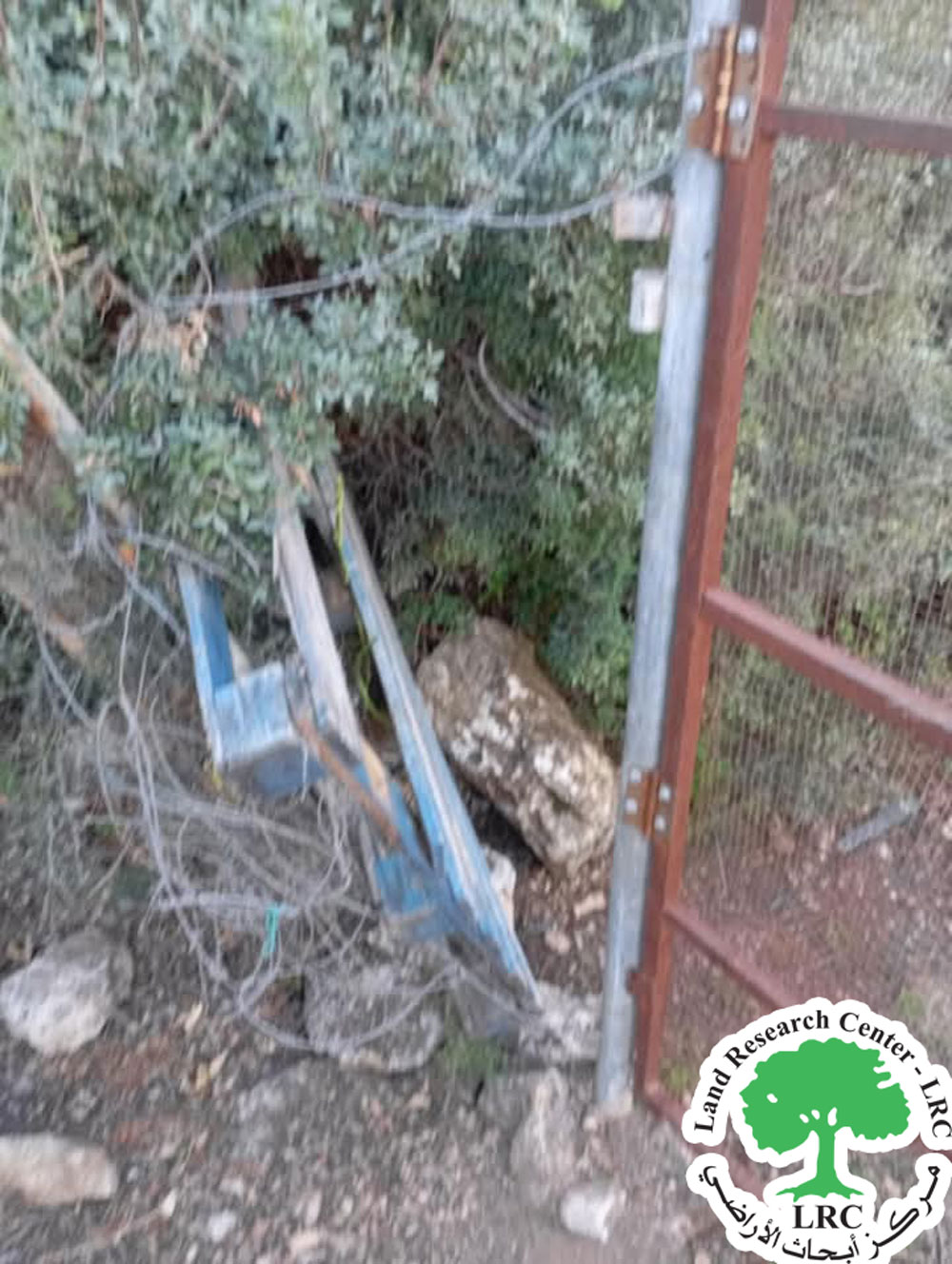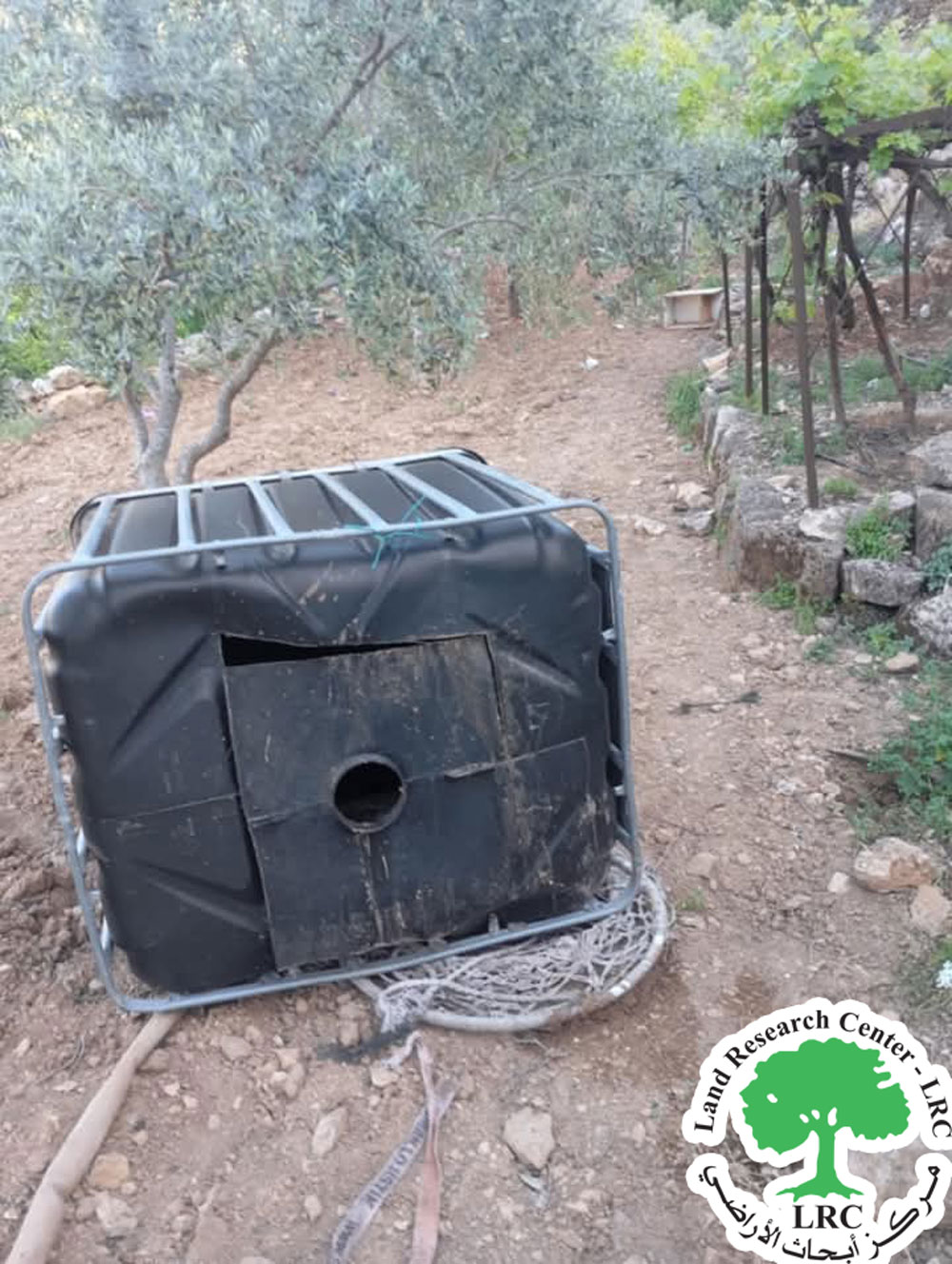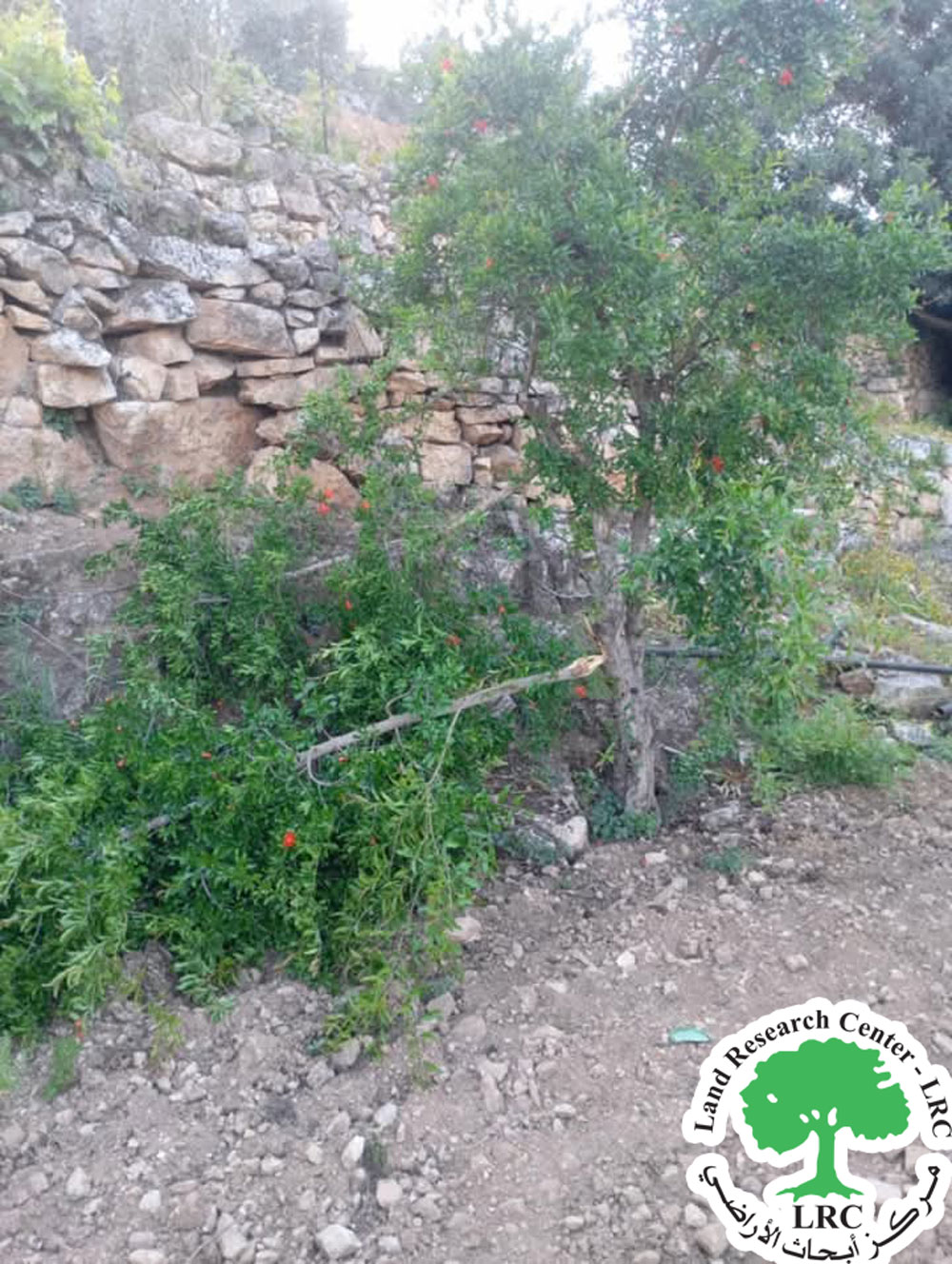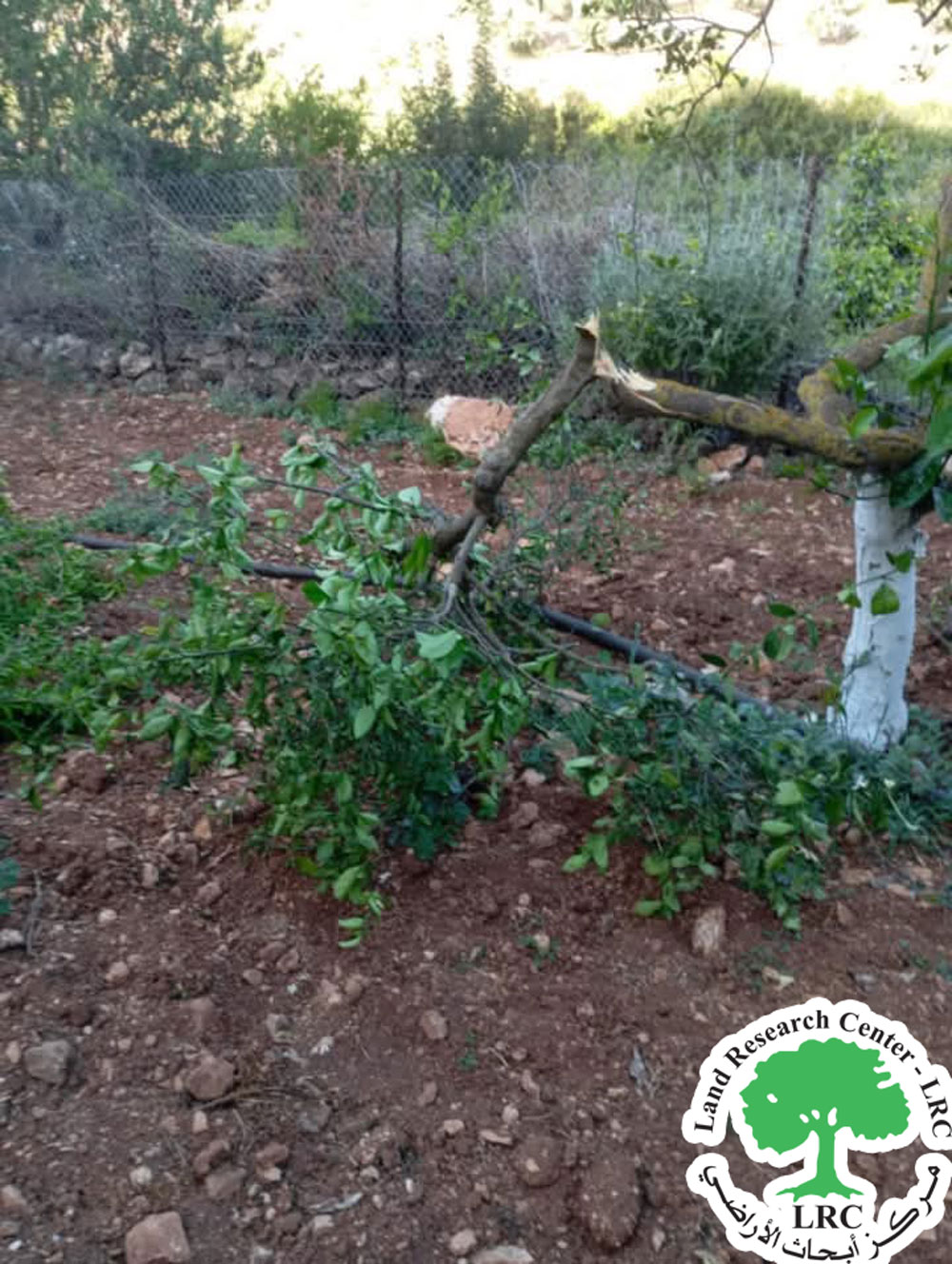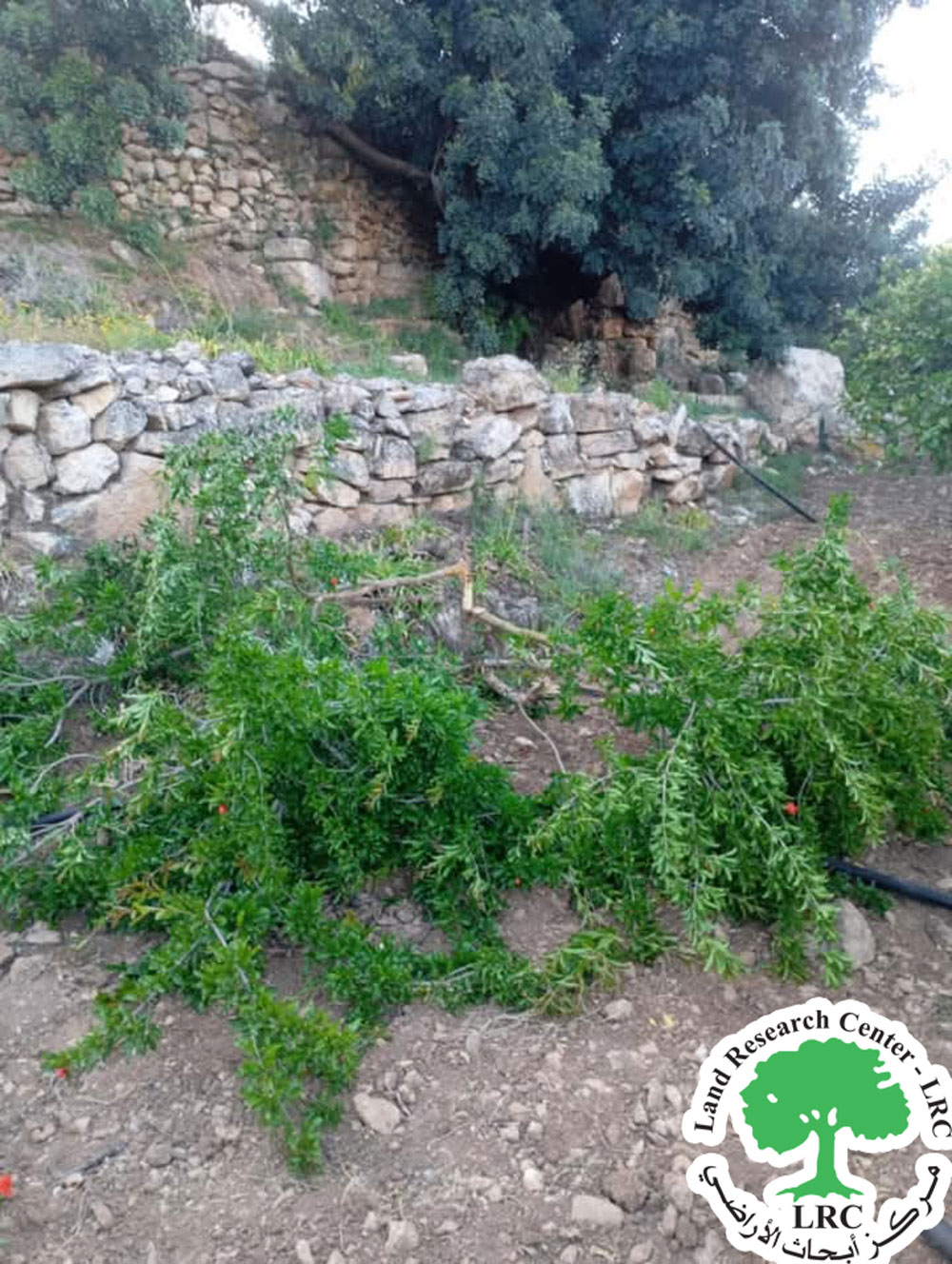Cutting and Destroying 19 Tress and Agricultural Equipment in Wadi Qana area/ Salfit Governorate
Violation: Cutting trees and assault on the agricultural properties
Location: Wadi Qana, Derstia town/ Salfit
Date: April, 20th 2025
Perpetrator: ‘’Karni Shomron’’ settlement
Affected party: Two families from Mansour family in the village
Details:
On Sunday afternoon, April, 20th 2025, Wadi Qana area followed to Deir Istiya north of Salfit witnessed a new attack from ‘Krani Shomron’ settlement settlers that located on the lands of the town.
13 of settlers from ‘Ein Al Basa’ in the middle of Wadi Qana area, they carried out provocative tours, and raided agricultural reservoirs, and a group of settlers damaging trees and agricultural equipment with aim of threat farmers in wadi Qana area.
Below are the names of the owners of the impacted facilities and information about them:
Affected farmer | Family member | Female number | The damage |
Qasem Naser Mahmoud Mansour | 2 | 1 |
|
Abd al Razzaq Khaled Mansour | 4 | 2 |
|
Total | 6 | 3 |
|
The affected farmer, Qasem Mansour to the researcher at LRC stated:
‘’I rely on agriculture of my source of income, I born in Wadi Qana area, and since whole of my life I have been working in agriculture as I owned an ancient house in ‘Ein Al Basa’ in the middle of Wadi Qana, the settlers attacked Wadi Qana by provocative visits between the fields and trying to hardly damaging in agricultural properties there.’’
He added:
‘’What is happening on Sunday afternoon that I was worked on my land near to my home, we saw a group of settlers, 13 settlers approximately exist in Wadi Qana, they threat us to leave the land, in that moment the settlers cutting the branches of the trees and destroying it in my land and Abd al Razzaq Mansour, then they went to my house and stealing the electric converter and destroying water tank before they leave to’ Karni Shomron’ settlement.
It is worth mentioning that the attack repeated several times daily in the fields of the farmers, according to the fields monitoring, this attack repeated several times with same farmers and different farmers worked in Al Wad, that threat and damaged the life of farmers (Who owned the lands) in Al Wadi, in addition to threat the agricultural sector.
About Wad Qana:
Wadi Qana is located in the northwest part of Deir Istya and surrounded by: Jeindafout, Kfar Laqif and Azoun from the east, Sinrya and Kfar Thulth form the west, Qarawat Bani Hassan from the south, and Amatin and Deir Istya from the east. Most of Wadi Qana lands are owned by farmers from Deir Istya. Wad Qana has a total area of 10 thousand dunums and contains 11 water springs, most of Wad Qana lands are planted with oranges and olives.
Attacks On Trees ……. A Form of Israeli Violations for Palestinian Environment:
The frequency of attacks by settlers and the military on Palestinian trees has been increasing. According to the field research team at the Land Research Center, since the beginning of 2024 until October 31, 2024, the occupation has targeted more than 57,323 trees and saplings, marking the highest number in the past 10 years. Of these trees, 90% have been completely destroyed, which signals a real environmental disaster.
The loss of trees, whether by cutting, burning, or poisoning, results in a reduction in the number of trees, leading to a decrease in vegetation cover. This, in turn, reduces the amount of oxygen produced in the region and increases the concentration of carbon dioxide. Moreover, the destruction of trees leaves animals without shelter or food, threatening the extinction of certain species due to the destruction of their natural habitat, which harms biodiversity.
Legal Commentary:
The Palestinian environment, in general, is subjected to numerous environmental violations by the Israeli occupation, disregarding all international and national laws and conventions related to the protection of environmental rights. The right to live in a clean and healthy environment is a fundamental human right that has been inherent to mankind since the beginning of creation. The occupation often attempts to present itself as being concerned with international environmental issues, despite having signed major environmental protection agreements, such as the Basel Convention in 1989, the Rotterdam Convention in 2008, the Stockholm Convention in 2001, and the Ramsar Convention in 1971, as well as air quality and climate protocols. Nevertheless, Israel continues to violate all of these treaties without accountability or oversight.
In addition to the provisions regarding the right to enjoy a clean and healthy environment for all those under military occupation according to international laws, conventions, and treaties, such as the International Covenant on Economic, Social, and Cultural Rights, adopted by the United Nations General Assembly in Resolution 2200A (d-21) on December 16, 1966, in Article (1), paragraph (2): "...All peoples, in pursuit of their own objectives, have the right to freely dispose of their natural wealth and resources without prejudice to any obligations arising from the international economic cooperation based on the principle of mutual benefit and international law. In no case shall a people be deprived of its means of subsistence...".
Undoubtedly, the violations carried out by the Israeli occupation contradicts with the laws of the occupation state itself before any other laws. Referring to the details of this case, the Israeli Penal Code of 1977 and its amendments stipulate that trespassing on someone else's property to commit a criminal act punishable by law is an offense. By reading Article 452 of the Israeli Penal Code, we find that the law punishes those who commit an offense or cause damage to property such as (a water well, a water reservoir, a dam, a floodgate, planted trees, a bridge, a tank, or a water cistern) with a penalty of five years imprisonment.
In addition to, Article 447 of the Penal Code states: "Anyone who does any of the following with the intent to intimidate, insult, or harass the property owner or commit a crime shall be punished by imprisonment for two years:
(1) Enters or crosses the property;
(2) After entering the property legally, remains there unlawfully.
(b) A crime is committed under this section if the offender carries a firearm or a cold weapon, and the punishment is imprisonment for four years."
By reading the text of this article, we find that the Israeli Penal Code criminalizes the mere act of entering someone else's property without permission, with the intent to insult, harass, or intimidate, and punishes this act with two years of imprisonment. The punishment increases to four years if the offender commits any act on someone else's property using a weapon or a sharp tool, referred to as a "cold weapon." This is explicitly criminalized in the text of Article 447 of the aforementioned Israeli Penal Code. Additionally, a penalty of 5 years imprisonment is imposed on those who cause damage to property mentioned in Article 452. Therefore, the violator, the "settler," should face a compounded violation: the first for entering a property that is not theirs, and the second for trespassing on and cutting down the planted trees, resulting in environmental harm.
Therefore, the Israeli aggressor blatantly violates both international laws and treaties, as well as the internal laws of the "occupying state," in a clear violation. Consequently, the "Israeli judiciary" must hold the settlers accountable and punish them for these actions based on the provisions of their own laws. However, there is no legal accountability for the aggressors by the Israeli judiciary. Despite this, every human being on this earth has the right to live in a clean, healthy, and safe environment, free from any violation or aggression against it.
مشروع: حماية الحقوق البيئية الفلسطينية في مناطق "ج" SPERAC IV - GFFO
Disclaimer: The views and opinions expressed in this report are those of Land Research Center and do not necessarily reflect the views or positions of the project donor; the Norwegian Refugee Council.
إخلاء المسؤولية: الآراء ووجهات النظر الواردة في هذا التقرير هي آراء ووجهات نظر مركز أبحاث الأراضي ولا تعكس بالضرورة وجهات نظر أو مواقف الجهة المانحة للمشروع؛ المجلس النرويجي. للاجئين

